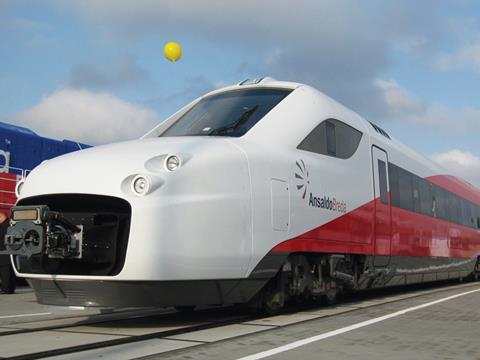
NETHERLANDS: The Dutch government has concurred with the decision by national operator NS to cancel its contract with AnsaldoBreda for 16 V250 trainsets, Deputy Prime Minister Lodewijk Asscher confirmed on May 7.
The findings of a review by NS had been presented to the cabinet by the State Secretary for Infrastructure & Environment Wilma Mansveld, and Asscher commented that ‘we cannot conclude differently than NS’. Finance Minister Jeroen Dijsselbloem said he expected NS to do ‘everything in its power’ to recover more than €180m paid towards the €336m contract signed in 2004.
The recommendation by NS to abort the V250 deal follows a similar decision by Belgium’s SNCB, which announced on June 3 that it was cancelling its order for three trainsets.
Since the trains were taken out of service on January 17, an NS task force headed by non-executive director Merel van Vroonhoven has been looking at both the technical condition of the V250s and alternative scenarios for the provision of cross-border services between the Netherlands and Belgium.
NS President Bert Meerstadt, who has announced his intention to step down from October 1, said the company’s priority now was to mitigate the impact on passengers, in both the short and longer term. The task force has outlined a ‘palette’ of three options for discussion with national and local authorities, which van Vroonhoven said would be compatible with the 2015-25 Core Contract for operation of the national network agreed with the government at the end of 2011.
As a short-term measure, NS plans to boost the interim service between Den Haag and Brussels from eight to 10 trains each way per day by the summer, and will discuss with SNCB the potential for a further increase to 16 train pairs as soon as possible. NS would also like to extend some services from Den Haag to Amsterdam, replicating the former Benelux service, but this would require timetable changes to free up sufficient paths, impacting on other routes including the Hanze Lijn between Amsterdam and Zwolle.
Another option is to expand the interim service using HSL-Zuid, with trains from Brussels running alternately to Den Haag or Amsterdam. However, this would depend on the availability of suitable rolling stock.
The taskforce has also suggested that the Amsterdam – Brussels Thalys service should be stepped up from nine to 11 trains/day each way. In the longer term, NS wants to see at least 22 high speed trains each way to and from Brussels, of which 10 would run beyond Brussels to serve Paris (Thalys) or London (Eurostar).
NS and SNCB have been asked to firm up the service options by October 1, so that Mansveld can present them to parliament.
Meanwhile, speaking at a hastily-convened press conference in Napoli, AnsaldoBreda director Maurizio Manfellotto described the Dutch and Belgian accusations as ‘baseless and unfounded’. The company insisted that many of the problems were down to normal ‘teething troubles’, and accused the operators of aggravating the damage by running the trains too fast in poor weather conditions. AnsaldoBreda has also threatened to sue the railways for the damage to its reputation.

















